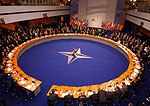The North Atlantic
Council

The North Atlantic Council (NAC) has effective political
authority and powers of decision and consists of Permanent
Representatives of all member countries meeting together at least
once a week.
The Council also meets at higher levels involving Foreign Ministers,
Defence Ministers or Heads of Government but it has the same authority
and powers of decision making, and its decisions have the same status
and validity, at whatever level it meets.
The Council has an important public profile and issues declarations
and communiqus explaining the Alliance's policies and decisions
to the general public and to governments of countries which are
not members of NATO.
The Council is the only body within the Alliance, which derives
its authority explicitly from the North Atlantic Treaty. The Council
itself was given responsibility under the Treaty for setting up
subsidiary bodies. Many committees and planning groups have since
been created to support the work of the Council or to assume responsibility
in specific fields such as defence planning, nuclear planning and
military matters.
The Council thus provides a unique forum for wide-ranging consultation
between member governments on all issues affecting their security
and is the most important decision-making body in NATO.
All member countries of NATO have an equal right to express
their views round the Council table. Decisions are the expression
of the collective will of member governments arrived at by common
consent. All member governments are party to the policies formulated
in the Council or under its authority and share in the consensus
on which decisions are based.
